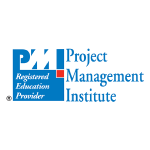PMI/ PROJECT MANAGEMENT PROFESSIONAL (PMP)®
Course Overview
Project Management Professional (PMP)® Certification is fast becoming the de facto standard for evaluating Project Managers. Today, companies, large or small, are emphasizing the need to hire Project Managers who hold the PMP® certification or invest in training their existing PMs on this certification. The PMP® training aims to train managers on how to lead project teams and achieve its predetermined objectives within the constraints of budget, resources, and the schedule.
At Makintouch, you can expect to learn how to manage the entire Project Management cycle i.e. from project planning, kickoff, controlling, monitoring, and ensuring successful sign-off. We offer instructor-led online PMP® certification training that can help busy professionals learn the intricacies of this highly sought-after certification. The PMP certification is globally recognized and widely accepted by companies across diverse industry verticals.

Course Objectives
After completing this course, students will be able :
- To understand the various project components in detail and learn how to effectively integrate these different parts to ensure successful project outcomes
- To acquire resource management skills
- To learn how to apply the Work Breakdown Structure (WBS)
- To know how to uncover the risks associated with a project
- To demonstrate project execution and project control techniques required for project success
- To carry out project closure activities on time and get formal sign-off on projects
Course Prequisites
The eligibility criteria and requirements for Project Management Professional Certification depends on your educational and professional background:
Target Audience
- Project Managers
- Team Leads
- Project Associates
- Project Assistants/Engineers
- Project Analysts
- Project Coordinators
- Software Developers
- Any individual aspiring to be a project manager
Course Outline
Introduction: Project Management
What is a Project?
What is Project Management?
Project vs Program vs Portfolio
Project Life Cycle
Project Manager and his Roles & Responsibilities
Trends in Project Management
Agile Considerations
Importance of PMO
Types of Organization and their influences in a project
Other factors influencing a project
Stakeholders and their influence in a project
Project Integration Management
Develop Project Charter
Develop Project Management Plan
Direct and Manage Project Work
Manage Project Knowledge
Monitor and Control Project Work
Perform Integrated Change Control
Close Project or Phase
Project Scope Management
Plan Scope Management
Collect Requirements
Define Scope
Create WBS
Validate Scope
Control Scope
Project Schedule Management
Plan Schedule Management
Define Activities
Sequence Activities
Estimate Activity Durations
Develop Schedule
Control Schedule
Project Cost Management
Plan Cost Management
Estimate Costs
Determine Budget
Control Costs
Project Quality Management
Plan Quality Management
Manage Quality
Control Quality
Project Resource Management
Plan Resource Management
Estimate Activity Resources
Acquire Resources
Develop Team
Manage Team
Control Resources
Project Communication Management
Plan Communications Management
Manage Communications
Monitor Communications
Project Risk Management
Plan Risk Management
Identify Risks
Perform Qualitative Risk Analysis
Perform Quantitative Risk Analysis
Plan Risk Responses
Implement Risk Responses
Monitor Risks
Project Procurement Management
Plan Procurement Management
Conduct Procurements
Control Procurements
Project Stakeholder Management
Identify Stakeholders
Plan Stakeholder Management
Manage Stakeholder Engagement
Monitor Stakeholder Engagement
What Our Students Have to Say


